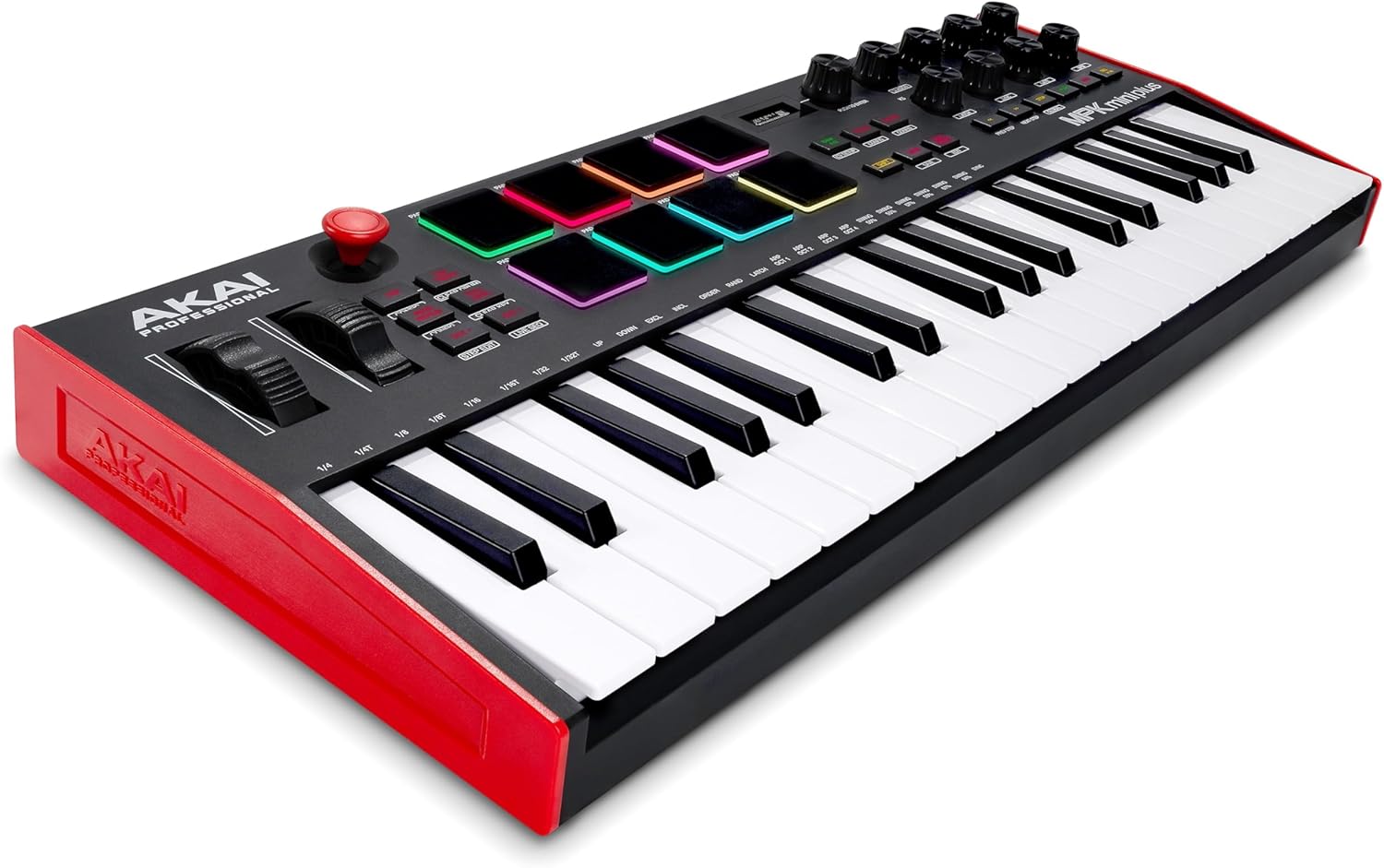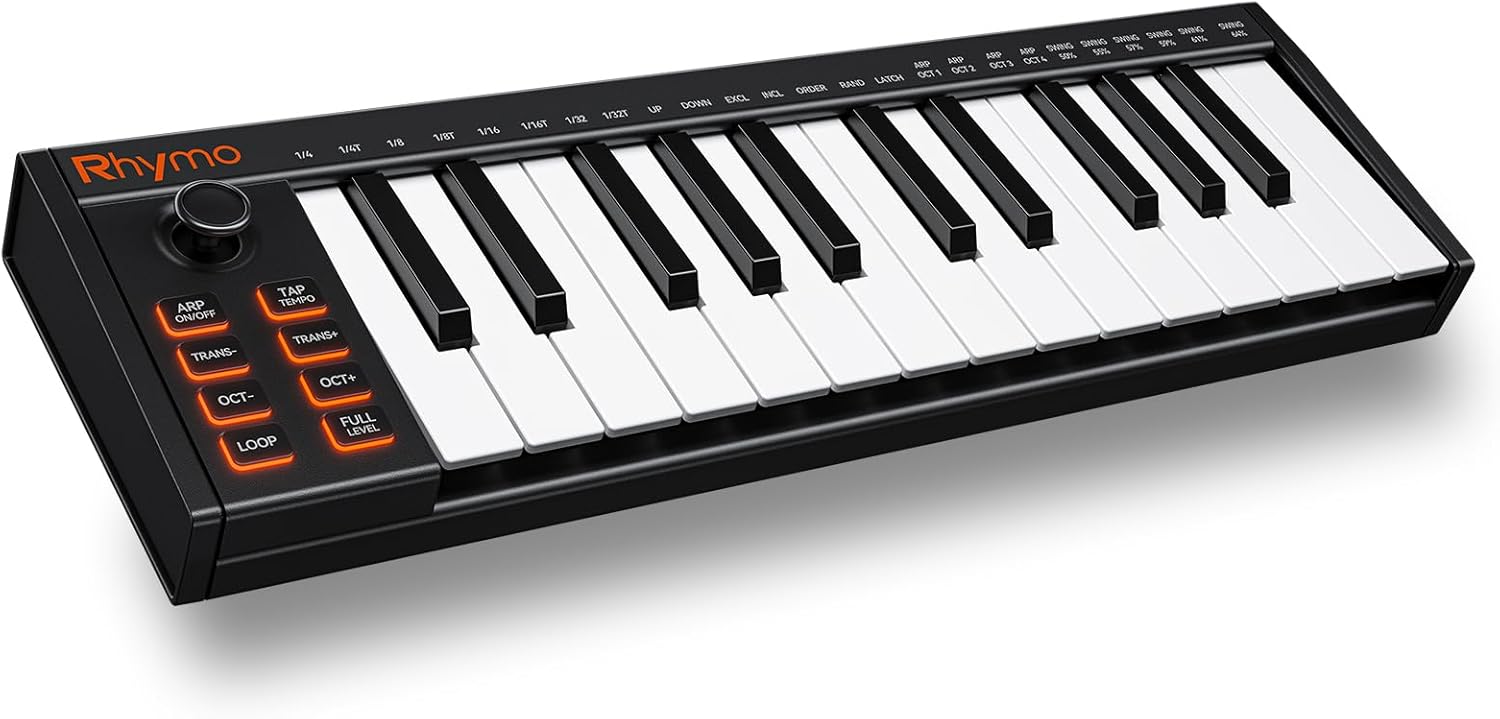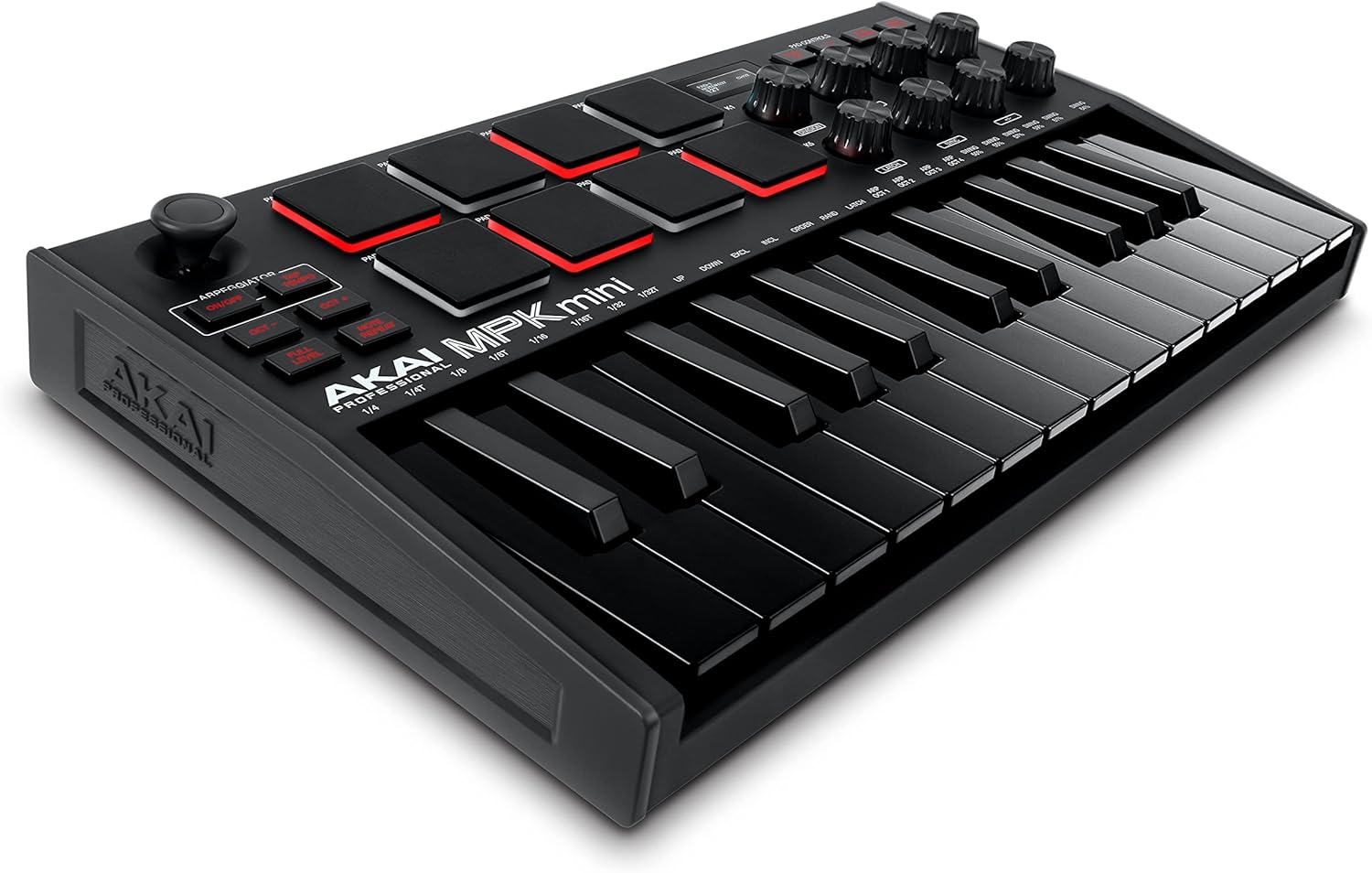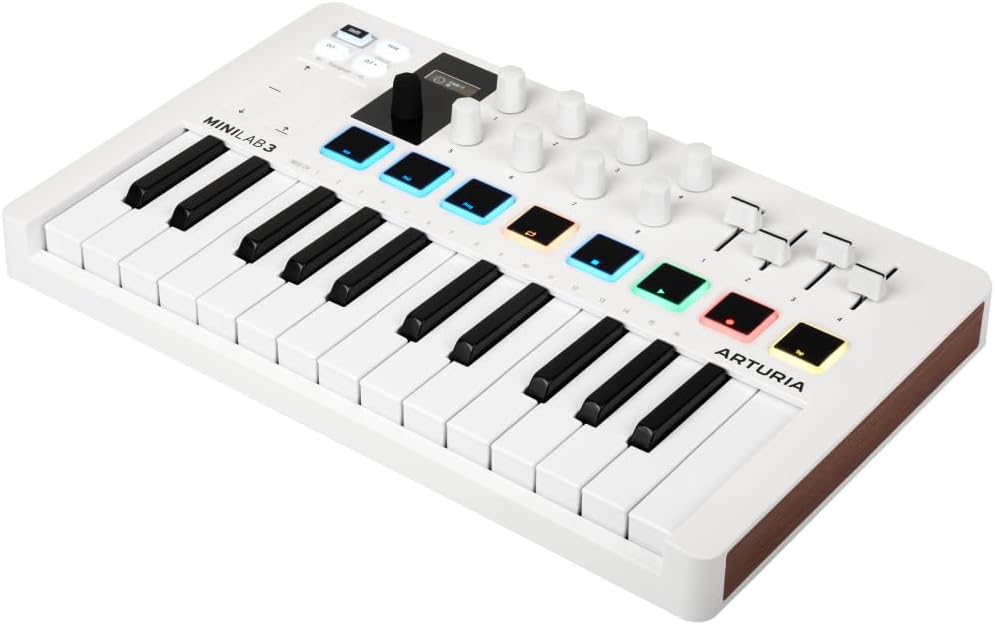Here’s an overview of the Best Mechanical Keyboard that we’ll explore today:
Mechanical keyboard controllers have evolved beyond simple key matrices into compact, feature-rich hubs for music production, live performance, and mobile workflows. This review compares five compact USB-powered MIDI controllers that straddle the boundary between keyboard-style performance and groove-centric production. My testing approach combines practical studio use with targeted feature verification: keybed feel, velocity sensitivity, pad responsiveness, control surface versatility (knobs, faders, arpeggiators, sequencers), DAW integration (NKS/Komplete, Ableton Live Lite compatibility), and portability/build quality. The lineup spans budget-friendly options to premium compact solutions, representing Arturia, Rhymo, and Akai Professional across 25- or 37-key configurations, plus versatile CV/MIDI I/O where applicable. The products covered are: Akai MPK Mini MK3, Akai MPK Mini Plus, Rhymo MDP25, Akai MPK Mini MK3 (Black variant), and Arturia MiniLab 3.
1. Akai Professional MPK Mini MK3 – 25 Key USB MIDI Keyboard Controller With 8 Backlit Drum Pads
- Brand: Akai Professional
- Manufacturer: Akai Professional
Overview: The MPK Mini MK3 is Akai’s compact, 25-key entry into portable production with a familiar MPC-inspired pad matrix and hands-on control. It ships with NKS integration for quick access to Native Instruments presets, plus 8 assignable knobs and 8 backlit pads, making it a strong all-in-one bundle for on-the-go producers who need immediate hands-on control and a starter sound library.
Performance-wise, the 25 velocity-sensitive keys feel responsive for basslines and melodies, while the 8 RGB pads support Note Repeat and Full Level for drum programming. The 4-way thumbstick provides dynamic pitch/modulation control, which is useful in live performance and realtime tweaking. The included MPC Beats and 2GB of sound content, along with Splice access, offer a turnkey workflow, though the compact keybed may require a lighter touch for long sessions. For DAW control, the eight assignable knobs let you map EQ, send levels, and automate parameters with reasonable tactile feedback. Best used as a mobile or second-compact rig for producers who value portability without sacrificing practical control features.
Pros
- Compact, highly portable 25-key layout
- MPC-style pads with Note Repeat and Full Level
- NKS integration for seamless NI plugin control
- Built-in arpeggiator and 4-way thumbstick for expressive play
- Includes valuable software bundle (MPC Beats, Splice, Komplete Select options)
Cons
- Limited octave range on a 25-key keyboard may constrain complex parts
- Knobs are endless rotaries with no tactile detents mentioned in spec
- Build may feel plasticky for long-term heavy use
2. Akai Professional MPK Mini Plus – USB MIDI Keyboard Controller with 37 Mini Keys
- Brand: Akai Professional
- Manufacturer: Akai Professional
Overview: The MPK Mini Plus expands the keyboard to 37 mini keys and adds a built-in 64-step sequencer, CV/Gate I/O, and full DAW transport controls, making it a more capable standalone or hybrid instrument for modular setups and beatmakers who want more sequencing and external gear integration out of the box.
Performance-wise, the 37-key bed provides more melodic range, enabling chord voicings and simpler bass lines without excessive octave hopping. The CV/Gate and MIDI I/O expandability is a standout feature for users integrating Eurorack or other modular sources, while the 8 RGB MPC pads stay responsive for drums and looping. The 64-step sequencer supports one track for drums and one for melodies/chords, enabling independent arrangement flow without a computer, which can be a game-changer for sketching ideas on the road. The transport controls and 8 assignable knobs deliver practical DAW control, though the learning curve will be steeper for new users who only need simple note input.
Pros
- 37-key bed offers more melodic range
- Built-in 64-step sequencer supports standalone sketching
- CV/Gate and MIDI I/O enable modular integrations
- 8 assignable knobs and 8 MPC pads with RGB lighting
- NKS integration and strong bundled software
Cons
- Higher price point compared to 25-key rivals
- Size is still compact but larger than 25-key models
- CV/Gate outputs require additional cabling and knowledge to use effectively
3. RHYMO 25 Key MIDI Keyboard Controller
- Brand: Rhymo
- Manufacturer: Rhymo
Overview: Rhymo’s MDP25 is a highly portable 25-key controller designed for plug-and-play use with broad DAW compatibility. It emphasizes speed and simplicity with an integrated arpeggiator, tap tempo, an X-Y joystick, and direct sustain pedal input, all powered via USB-C, which makes it particularly attractive for mobile creators and solo performers using tablets or laptops.
Performance-wise, the X-Y joystick enables expressive control for pitch and modulation, while the arpeggiator supports latch for hands-free performance. The 16-channel capability and velocity-sensitive keys maintain a responsive playing experience, and the dedicated octave controls widen musical range without adding bulk. The device’s class-compliant USB-C power delivery ensures immediate use with modern Macs and iPads, but the compact 25-key layout may limit complex chord shapes for some users. Overall, Rhymo excels as a budget, ultra-portable option with surprisingly robust creative features.
Pros
- Ultra-portable, USB-C bus-powered design
- Integrated arpeggiator with latch and tap tempo
- X-Y joystick for pitch/modulation control
- Class-compliant, plug-and-play with major DAWs
- Affordable price point
Cons
- 25 keys may constrain complex arrangements
- Limited control surface compared to bigger 37-key models
- Build materials are plastic-heavy and may wear with heavy use
4. Akai Professional MPK Mini MK3 – 25 Key USB MIDI Keyboard Controller With 8 Backlit Drum Pads
- Brand: Akai Professional
- Manufacturer: Akai Professional
Overview: This listing is functionally identical to the MPK Mini MK3 in features and software bundle, differentiated primarily by color and listing variant. It offers the same 25-key velocity-sensitive keyboard, 8 backlit pads, 8 assignable knobs, NKS support, and bundled software, positioning it as a consistent, portable production partner.
Performance-wise, you can expect the same MPC-style pads and thumbstick for pitch/mod with arpeggiator, along with the same 8 knobs to control plugins and mixer parameters. The MK3’s compact footprint makes it ideal for travel setups or small desks, and the included Komplete/NKS bundle provides immediate access to NI sounds, which is valuable for limited budgets. However, the use-case remains identical to Product 0, so distinctions mostly come down to physical color and minor packaging differences.
Pros
- Same compact design and feature set as MPK Mini MK3
- NKS integration and strong NI bundle
- MPC-style pads with Note Repeat
- Lightweight and portable
- Solid value for a 25-key controller
Cons
- Color variant does not impact function
- Still limited octave range for complex parts
- Plastic construction may feel less premium over time
5. Arturia MiniLab 3 – Universal MIDI Controller for Music Production
- Brand: Arturia
- Manufacturer: Arturia
Overview: Arturia’s MiniLab 3 is a 25-key controller focused on a premium feel and an integrated software ecosystem. It includes 8 RGB-lit performance pads, 8 assignable encoders, two touch strips for pitch and modulation, a built-in arpeggiator, and USB-C connectivity. The package emphasizes a polished workflow via a tightly integrated software bundle (Analog Lab V, Ableton Live Lite, Model D emulation, etc.) and a five-year warranty.
Performance-wise, Arturia emphasizes tactile controls, with velocity-sensitive keys and color-coded pads that help performers map different sounds across projects. The encoders offer smooth, clickable control, and the two touch strips add a physical dimension for real-time expression. The DAW integration with major platforms (Ableton Live, Logic Pro, Reason, Bitwig, FL Studio) and the comprehensive software package make MiniLab 3 attractive for users who want a plug-and-play, studio-grade experience in a compact form. The main trade-off is that while the build feels sturdy and the keys are well-regarded, the 25-key layout still limits long-range melodic passages without committing to a larger keyboard.
Pros
- Premium-feel build and tactile controls
- Eight RGB pads plus eight assignable encoders
- Two touch strips for pitch and modulation
- Extensive software bundle and 5-year warranty
- Strong DAW integration with major platforms
Cons
- 25-key limit may constrain complex parts
- Price is higher than some 25-key rivals
- Software bundle may be overwhelming for beginners
Frequently Asked Questions
We’ve compiled answers to the most common questions about mechanical keyboards to help you make an informed decision.
Conclusion
.
.
Final thoughts here.




